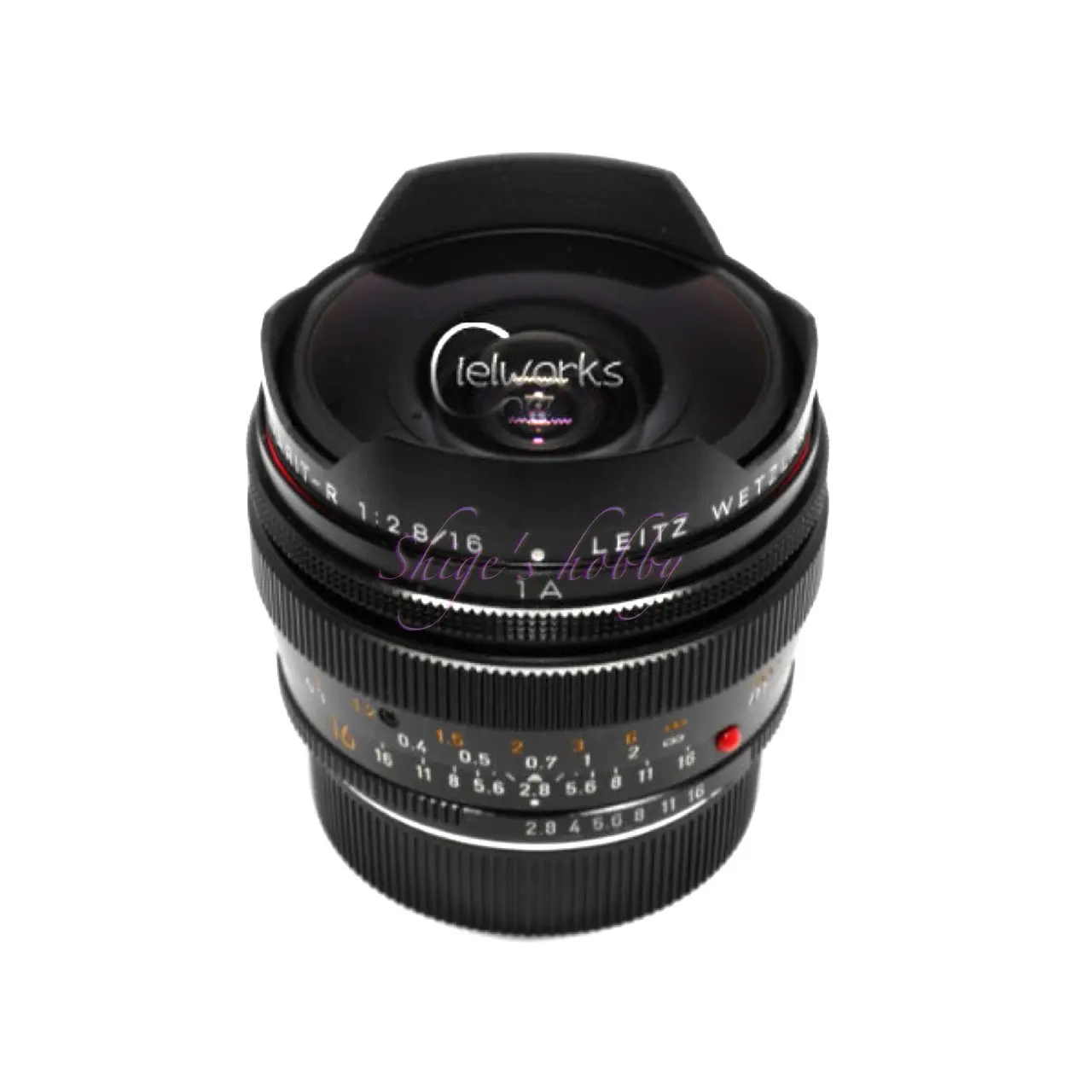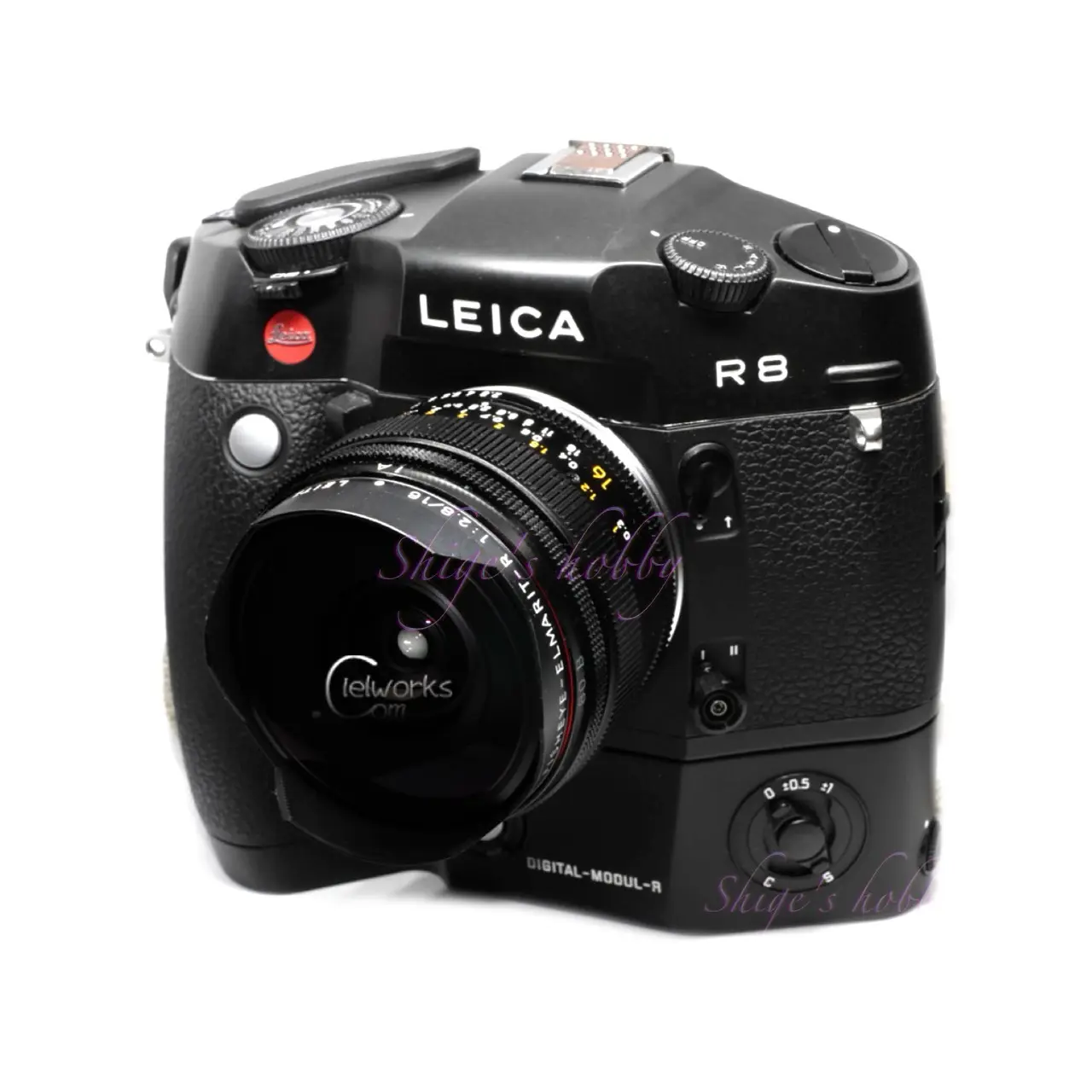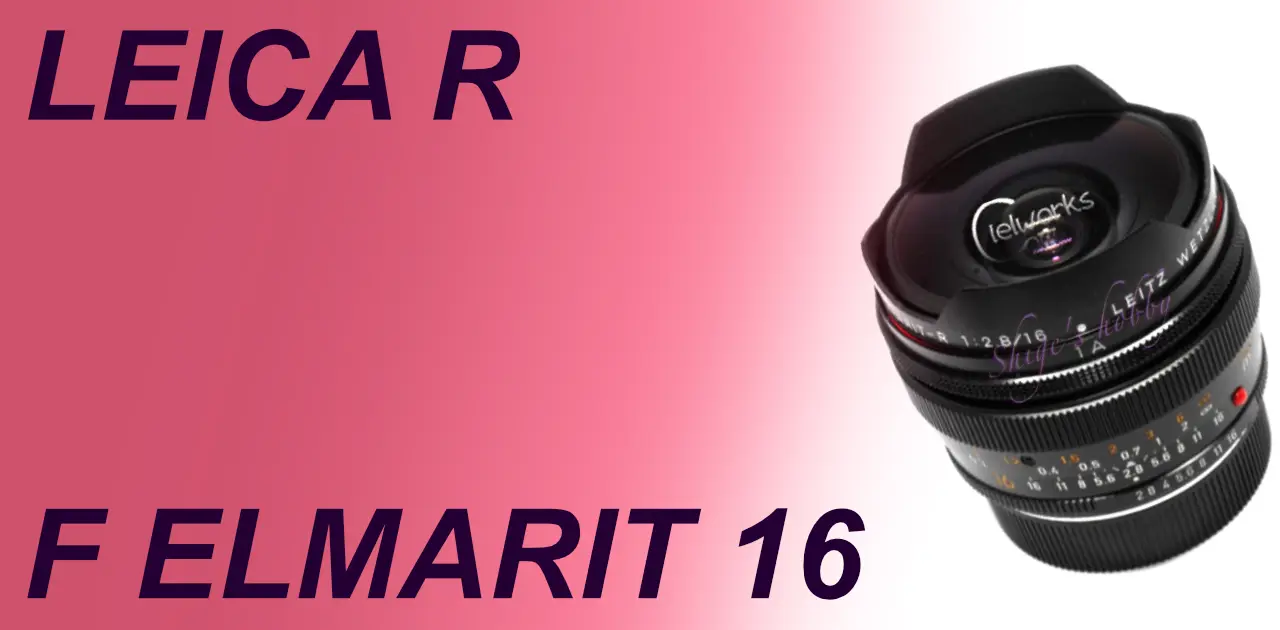A review and sample photos of the Fisheye Elmarit (Elmarit) 16mm F2.8 lens used with the film camera LEICA R8 and the digital camera LEICA SL Typ601.
Table of contents
Gallery
The following cameras were used to take the sample photos:
- LEICA R8 + FUJIFILM 100 (film SLR camera)
- CANON EOS 1D Mk-IV (digital SLR camera)
- CANON EOS 7D (digital SLR camera)
- LEICA M-P typ240 (mirrorless digital camera)
- LEICA SL typ601 (mirrorless digital camera)
Review


1.Overview
The LEICA FISHEYE ELMARIT 16mm is a Leica R-mount fisheye lens released in 1974. Approximately 3,000 units were manufactured over the five years until production ceased in 1979. The lens was made in Japan, and its optical design is said to be identical to that of Minolta’s MC Fisheye Rokkor 16mm f2.8.
The petal-shaped hood protrudes slightly forward from the lens barrel, blocking excess light when shooting in 35mm format. The shadow of this hood can be seen on medium-format digital sensors, as described below, so it appears to function properly in 35mm format. Even with the sun in backlight, there is no noticeable ghosting, demonstrating excellent backlight resistance.
Since a filter cannot be attached to the front of the lens, a lens cap (14089, 14089M) is used to protect the lens.
2.Usability
The LEICA FISHEYE ELMARIT 16mm is not a lens that I use very often, as fisheye lenses intentionally leave their image distorted and I think it’s best used casually, as a short break from shooting, but the close-up shots that take advantage of the 0.3m minimum focusing distance are interesting.
As shown in the gallery, I use it to take snapshots of urban architecture and cherry blossoms in full bloom at the same time.
This particular lens is a modified lens with a ROM terminal; when Leica released the Leica R8/R9 film cameras, they modified lenses for their previous cameras to include a ROM terminal, for an additional fee. Fisheye lenses with ROM terminals are quite rare and are hard to come by, even on eBay.
・LEICA R8 film camera
When using it with the LEICA R8 film camera, the lens’s deep depth of field makes it often difficult to determine the peak of focus in the viewfinder, so if I had the shutter speed available I would often stop down the aperture a little and set the distance to achieve deep focus.
The depiction on film matches well with the soft depiction of the negative film I used.
・EOS-1DS MK-III & EOS-1D Mark-IV
When shooting with the Canon EOS-1Ds MKIII, which has a 35mm full-frame 20-megapixel sensor, and the EOS-1D Mark-IV, which has an APS-H 16-megapixel sensor, Error 20 (Err20) occurs with every shot.
Due to the EOS-1D Mark-IV’s small sensor size, the actual focal length is equivalent to 16mm * 1.3 = 21mm. A peripheral cut of this size can appear somewhat fisheye-like. This is roughly the same as the shooting range of the LEICA Digital Module R (DMR), which has a similar sensor size.
Some lenses that exhibit Error 20 (Err20) do not necessarily mean that you cannot take pictures, but you can avoid it using the following method.
If Err20 occurs when the mirror returns to its original position after the shutter is pressed and the foreign object detection sensor in the mirror box detects it, turning the focus ring to a distance of about 3m immediately after taking the photo will cancel the foreign object detection sensor and allow the image to be recorded as is.
This method is not recommended, as it is unclear whether it will work with all camera models and individual cameras. Additionally, lenses that are caught by the foreign object detection sensor when the mirror lowers will not be able to be used for photography.
Of the Leica R-mount lenses I own, this error occurs most noticeably with wide-angle lenses, and has been confirmed to occur with lenses such as the SUPER ELMARIT-R 15mm, ELMARIT-R 19mm-II, SUPER ANGULON-R 21mmF4, VARIO ELMAR-R 21-35mm, ELMARIT-R 24mm, and SUMMILUX-R 35mm F1.4.
The three Leica R-mount wide-angle lenses that I have been able to use without any issues without using the workarounds described above are the SUPER ELMAR-R 15mm and ELMARIT-R 28mm (first and second generations). I have not tried all lenses, but lenses with focal lengths of over 50mm should work without any issues.
・EOS-7D
The EOS 7D is equipped with an APS-C 18-megapixel sensor, and the mirror has been miniaturized to match the sensor size, so all of the Leica R-mount lenses I used were compatible with it without any problems. However, because the sensor size is small, the actual focal length is 16mm * 1.6 = 26mm, which almost completely eliminates the significant distortion of fisheye lenses, so it doesn’t feel out of place when used as a normal wide-angle lens.
The link below contains a performance report on Leica R-mount lenses when attached to a Canon EOS digital camera.
・LEICA M-P typ240
Because the LEICA M-P typ240 is a rangefinder camera, it is not possible to check the focus position in the viewfinder with lenses other than M-mount lenses, which are linked to the rangefinder. Even if an R-mount lens is attached to the camera via the Leica R adapter for M (14642) mount adapter, it will not be linked to the camera’s rangefinder.
Therefore, in order to check the focus position, an add-on electronic viewfinder (EVF-2) is required.
When the LEICA M-P typ240 is equipped with the EVF-2, it operates similarly to a mirrorless camera, but compared to when an M-mount lens is attached, the camera’s processing speed slows down due to the EVF processing, resulting in significantly slower shutter response.
Furthermore, when using the R adapter for M (14642) mount adapter, registered R-mount lenses can be selected from the menu and recorded in Exif. Lenses not listed in the menu cannot be added, so you will have to select a similar lens.
Furthermore, the R adapter for M (14642) mount adapter does not have the function to read the ROM information of Leica R-mount lenses.
The image quality is no different from other 20-megapixel cameras.
・LEICA SL Typ601 &LEICA T series
When used with the LEICA SL Typ601, which is equipped with a 35mm full-frame 24-megapixel sensor, you can enjoy the inherent distortion of a fisheye lens.
When using lenses with a ROM terminal with the LEICA SL Typ601, LEICA T series, or LEICA CL Typ7323 using the genuine Leica mount adapter, the Leica R-Adapter L (16076), the lens information recorded on the lens can be transferred to the camera. This information is recorded in the EXIF shooting data, making it easier to organize your photos compared to using lenses from before the R-camera.
・HASSELBLAD X2D-100C
3.Summary
In conclusion, to sum up the LEICA FISHEYE ELMARIT 16mm, it is the only fisheye lens made by Leica.
It is not a lens that is used very often, so it is not necessarily a lens that is necessary, but it is a lens that R-mount freaks cannot do without.
Specifications, considerations, etc.
Like the SUPER ELMAR 15mm, SUPER ELMART 15mm, and ELMARIT 19mm (2-inch), this lens has four built-in color filters (red, blue, orange, and achromatic). Because these filters change the color tone during recording, they’re useless in the digital age, where colors can be changed relatively freely in post-processing.
Prices for Russian-made fisheye lenses start at around 20,000 yen, so even including the Leica brand, it’s undeniably expensive. Interestingly, the used price of the MC Fisheye Rokkor 16mm f2.8, which is said to have the same design, is also more expensive than other Minolta MC lenses, which I feel is due in large part to the hearsay power of its use under the Leica brand.
| Item | Value | note |
| focal length(mm) | 16 | |
| Maximum aperture | 2.8 | |
| Minimum aperture | 16 | |
| Lens configuration | 11elements 8groups | |
| Minimum distance(m) | 0.3 | |
| Lens length(mm) | 60 | |
| Lens max diameter(mm) | 71 | |
| Filter diameter(mm) | – | Filters cannot be attached because the hood is integrated into the front of the lens. Three color filters for film cameras are built in. |
| Weight(g) | 470 | |
| Release date | 1974 *2 | |
| Production Number | 2,950 *2 |
Reference links
Affiliate links
- Please see the disclaimer regarding advertising here.
- Italicized links in the text are advertisement links that take you to other sites.
- Amazon Affiliate Link Leica Lens
- Amazon Affiliate Link Leica Books
- Amazon Affiliate Link / Classic Camera Specialty

Amazon Prime Sale
Update history
- 2025.11.12
- 2025.2.14
- 2024.02.13:Update article
- 2022.12.07:First draft



Be First to Comment